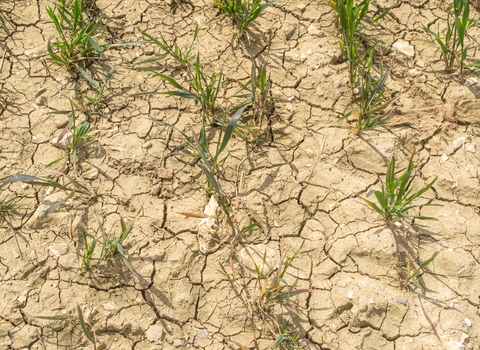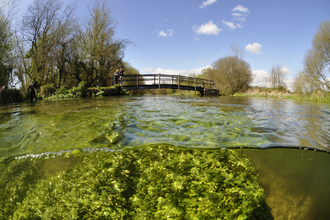
Drought and over-abstraction
Water companies often abstract water directly from our rivers, often faster than nature can replenish them naturally. While changing rainfall patterns mean that many of our rivers have less water flowing through them for both people and nature.
How do droughts and over-abstraction impact wildlife?
When drought or over-abstraction takes place, low water levels combined with high temperatures lead to declines in oxygen levels which in extreme cases causes fish distress and then death.
Low water levels caused by drought or over-abstraction also prevent certain species of fish, such as Atlantic Salmon or Trout, from migrating, which can completely disrupt important stages of their lifecycle.
Other pollutants in the river, such as pesticides, fertilisers and chemicals from sewage, become more concentrated because of the lack of dilution - often to a higher level than wildlife and plants can tolerate.
Together, these impacts all cumulatively cause stress to species and reduce food sources for fish, insects and invertebrates, with knock-on effects for animals higher up the food chain such as water voles and otters.
What action is needed to reduce over-abstraction and help wildlife through droughts?
We need to invest in nature-based solutions that keep more water in the system year-round, reducing the impacts of extreme weather. This includes reintroducing beavers that capture water in their dams, slowing down river flow and filtering pollutants.
What our Government needs to do
-
Bespoke legal protections for all our chalk streams that protect them from over-abstraction and pollution and drives investment by water companies into these special ecosystems.
-
Scale climate change ambitions
-
More powers and resources for the enforcement of water companies
-
Bring forward targets to put our rivers in good ecological condition
-
Mandate water companies to be statutory consultees in strategic planning to ensure that water resource capacity is considered within planning decisions.
-
Double the nature-friendly farming budget to help support farmers to restore our rivers.
What our Water Companies needs to do
-
Rapidly reduce reliance on abstraction from chalk streams, including through drought permits.
-
Nature should come first – rapidly scale and prioritise nature-based solutions over hard infrastructure where appropriate.
-
Make it clear where our water is coming from! Increase ambition and transparency in their Water Resource Plans so the public can clearly see and hold water companies responsible on environmental ambitions.
-
Prioritise leak reduction - Southern has only reduced its leaks by five per cent over the past two years despite a reduction target of 15 per cent by 2025.
-
Support customers to reduce their water consumption to 100 litres per day (or less) by 2050.
What our Councils need to do
-
We need to see councils deliver an Action Plan for rivers to drive coordinated efforts across catchments to restore our rivers and drive investment to where it's needed the most.
-
Councils can support our rivers by putting in place strong policies in the Local Plans to protect our rivers, for example by embedding the recommendations of the Chalk Stream Strategy and ensuring there are adequate buffers between developments and rivers.
-
Council can also monitor the health of our rivers and use this information to place pressure on water companies to stop damaging practices.
-
Support communities to take part in river protection and restoration initiatives by organizing citizen science opportunities, workshops, public meetings, and awareness campaigns.





